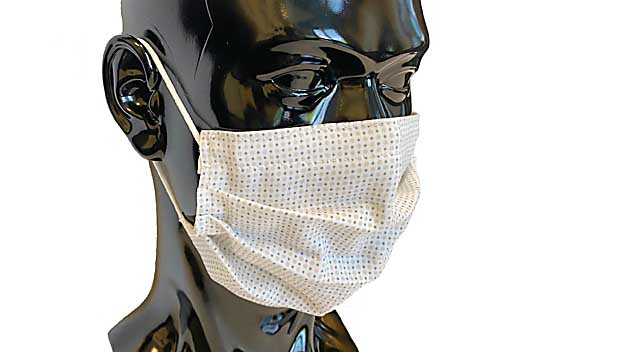Researchers say masks of special, electrical fabric can zap coronavirus on contact
Published 5:01 pm Tuesday, May 26, 2020
An Indiana University research team say a special electrically charged fabric that could be used for face masks could kill the coronavirus on contact.
The fabric is called electroceutical which refers to a matrix of embedded microcell batteries that creates an electric field and wirelessly generates a low level of electricity in the presence of moisture.
It is well known that viruses can be electrically charged. Coronaviruses rely on electrostatic interactions to be able to attach to their host and assemble themselves into an infective form. Their structure must remain stable in order to spread infection. The IU researchers sought to exploit the coronaviruses’ own electrokinetic characteristics to try to dismantle their infectivity.
The team at IU has been heavily involved in the generation of foundational evidence of the electroceutical fabric’s mechanism of action and use during the last six years. The research results demonstrate that the ability of the virus to infect is fully eliminated within one minute of contact with the fabric, which disrupts the electrostatic forces the virus needs.
The data shows that coronaviruses are killed by exposure to the low-level electric field-generating fabric, which is currently in use as a broad-spectrum antimicrobial wound care dressing.
The immediate goal with the data findings is to receive approval through the FDA’s Emergency Use Authorization program to apply use of the fabric specifically for face masks in the fight against COVID-19. Currently, face masks have little to no ability to kill viruses or bacteria.
The electroceutical surface technology, called V.Dox Technology, is a proprietary dot-matrix pattern of embedded microcell batteries that create an electric field and wirelessly generate a low level of electricity when moist.
Previously, the same researchers have reported the antibacterial and antibiofilm effects in the management of infected wounds. The electroceutical technology offers clinicians a non-antibiotic solution for infection risk reduction and potentially increases its value for use in face masks and possibly other surface treatments.
The electroceutical dressing is currently FDA cleared and commercialized by Vomaris Inc. It is made of polyester fabric printed with alternating circular metal dots of elemental silver and zinc metals that create moisture-activated microcell batteries.
“This work presents the first evidence demonstrating that the physical characteristic features of coronaviruses may be exploited to render them non-infective following contact with low-level electric field-generating electroceutical fabric,” said Chandan Sen, principal author of the study and director of the Indiana Center for Regenerative Medicine and Engineering at the IU School of Medicine.
“Our hope is that these findings will help Vomaris receive FDA Emergency Use Authorization and that we can utilize this fabric widely in the fight against COVID-19, ultimately saving lives.”






